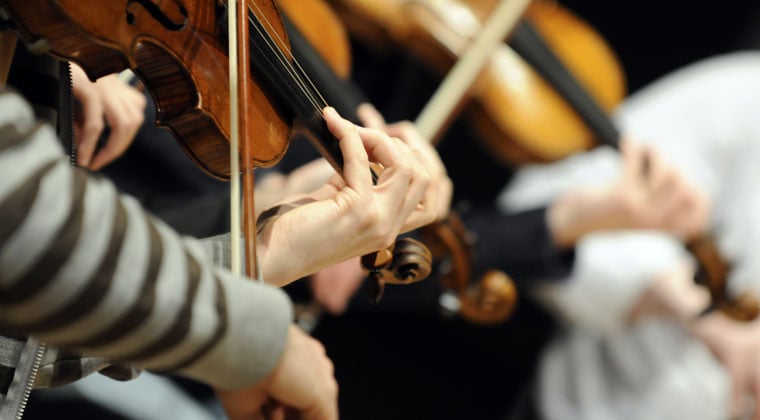How To Build Your Improvisation Skills

Do you cringe when you hear the word Improvisation? Does the idea of moving off page - and into the wilds of personal creativity - give you symptoms akin to an anxiety attack? You're not alone.
Many musicians have become so accustomed to - and feel so safe within - the black-and-white boundaries of composed notes on a page - that the thought of going "rogue" is...well...unthinkable. Fortunately, the solution to this dilemma is a very clear and simple path - requiring a commitment to beefing up your improvisation skills.
Building Improvisation Skills Increases Performance Panache
But why, you ask, do I need to work on improvisation when I only play notated musical compositions? Aren't those two different worlds.
In theory, they might be; in reality, any musician who's ever blanked in the middle of a performance knows just how important the ability to improvise is. Plus, in addition to helping you out when/if needed, the ability to improvise deepens your understanding of music fundamentals - allowing you to hear, feel and experience music in deeper, more thorough and expressive ways.
Fortunately, you don't have to improvise, in public, via open mic nights to build your improv skill set. The following ideas can be integrated right into your current practice time and will slowly - or quickly - illustrate how fun and easy improvising can be.
Improvise a little each day
You already have a dedicated practice schedule in place. Now, build five-minutes of "improv" into that time. Warm-ups should always come first. Afterwards, consider improvising for five minutes - expressing how your day went, a new take on an old scale, or whatever notes happen to move you. If you're nervous or wary, try adding the improv section to the end of your rehearsal times, when you may feel more free and connected to your instrument via the music you're working on.
The key is to not focus on perfection or crowd-pleasing sounds - those will come in time. Just let yourself go, and enjoy feeling how all that practice and muscle memory continues to pay off.
Play what you hear in the world around you
Every sound you hear in the world around you, from the rustle of leaves, to the rumble of a car engine, to the undulating tones of a nearby conversation has a pitch or tone that can be emulated on the violin. Even qualities of sound - smooth, raspy, vibrational, explosive - can be mimicked by a string instrument.
If creating a musical piece or line of your own is too intimidating, try listening and recreating what you hear outside or around your general vicinity.
Arrange a favorite solo for your string instrument...
...but without sheet music. Play a recorded version of your favorite instrumental solo - whether it's a Miles Davis trumpet riff, a Led Zeppelin interlude or whatever your current favorite musical piece may be. Then, do your best to recreate that solo by ear. Once you have that down, improvise a complimentary riff that harmonizes with it or create phrases of harmonic drones.
Improvise a solo in a piece that doesn't have one
In a different version of the aforementioned idea, play a favorite piece of music that doesn't have a notable solo and create one of your own.
Same piece, different rhythm
Changing the rhythm is one type of improvisation, and it can shift a classical piece into a country swing, or a jazz piece into a classical one, simply by your inspiration in that moment.
What if you were to take your current practice piece and completely alter the rhythm? This is a safe way to improvise and it simultaneously deepens your connection with the importance of rhythm in relationship to overall feel, tone and style of a composition.
Alternate two notes, then add a third, and a fourth and...
Start very simply by playing two notes, alternating them over and over. Then add a third note. Does it fit? If so, play those three and add a fourth. Enjoy the process of intuiting the harmonies and dissonance - some that work and others that don't - as you improvise your way into real musical phrases.
Partner, trio or chamber up
Have a friend, or two, or more that you enjoy practicing with? Consider teaming up with the goal of writing your own piece of music together. While the act of putting musical phrases onto paper in notation form is methodical, the numerous ways you'll improvise, and improvise again, as you write various melodies and harmonies, compose individual rhythms and counterpoints, will give you invaluable experience with diving deep into the intricacies of musical fabric.
By the time you've made it through all of these ideas for building improvisation skills, you'll be a practiced improviser, a better musician and a more confident performer. Now, let the creative juices begin to flow and start improvising!


